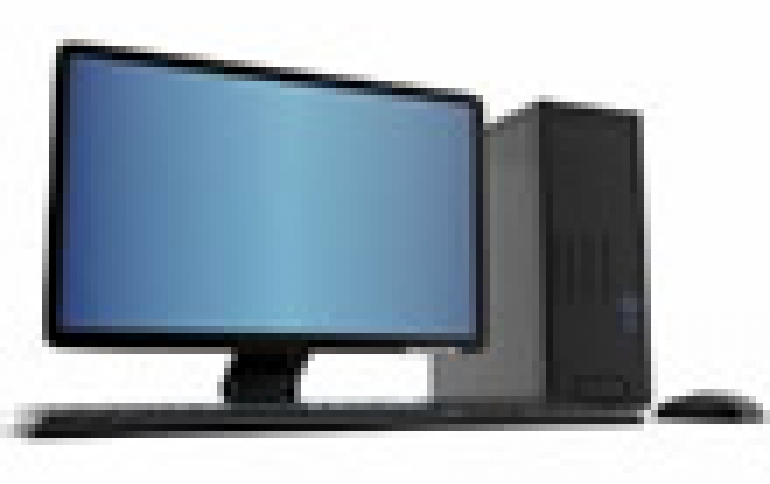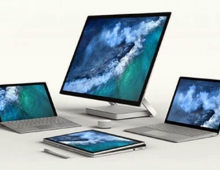
PC Shipments Declined in Fourth Quarter of 2013
Worldwide PC shipments declined in the fourth quarter of 2013, according to results released by by Gartner and IDC.
Worldwide PC shipments totaled 82.6 million units in the fourth quarter of 2013, a 6.9 percent decline from the fourth quarter of 2012, according to preliminary results released by Gartner, Inc.
IDC almost agreed with Gartner's results, reporting that worldwide PC shipments for the same period totaled 82.2, representing a year-on-year contraction of -5.6%.
"Although PC shipments continued to decline in the worldwide market in the fourth quarter, we increasingly believe markets, such as the U.S., have bottomed out as the adjustment to the installed base slows," said Mikako Kitagawa, principal analyst at Gartner. "Strong growth in tablets continued to negatively impact PC growth in emerging markets. In emerging markets, the first connected device for consumers is most likely a smartphone, and their first computing device is a tablet. As a result, the adoption of PCs in emerging markets will be slower as consumers skip PCs for tablets."
HP and Lenovo have been virtually neck and neck for the top global position in the PC market throughout 2013. Lenovo took the lead in the fourth quarter, as it did last quarter, accounting for 18.1 percent of global PC shipments, according to Gartner. IDC gave Lenovo a 18.6% market share.
Lenovo showed strong growth in all regions, except Asia/Pacific, where China continued to be a problematic country for the company.
Lenovo ic surrently navigating the post-PC era and aims to become a smartphone player.
"Traditional PC vendors are no longer our top rivals nowadays," said Yang, the chairman and CEO of Lenovo Group Ltd. "Our next step is to challenge Apple and Samsung in the portable consumer electronics sector."
But still, Gerry Smith, president of Lenovo Group in Americas, said at CES that the company would first establish its smartphone brand in Latin America and Brazil, then enter the U.S. market in the next two to three years.
After this brief pause, let's return to PC sales results.
HP experienced a shipments decline of 7.2 percent in the fourth quarter. U.S. and Latin America were two regions where HP could not increase its shipments. Gartner says HP held a 16.4% market share for 4Q13, while IDC says the company held a 16.8% share.
Dell saw growth rise to 5.8% in 4Q13 (11.8% share, Gartner) compared to the previous year. IDC says Dell managed to hold the 12.2% of the market.
With the completion of the leveraged buyout, Dell has redefined its strategic focus onto its PC and device businesses. Dell's focus is now beyond its traditional strength in the professional PC market; its focus is now also on consumer PCs, particularly in emerging markets.
Acer and Asus follow with a 7.8% and 6.5% market share, according to Gartner's figures.
Acer and Asus's ranking remained unchanged compared with a year ago. Both companies have more focus on tablets, and their fourth-quarter results clearly proved their strategic focus. Acer has established a strong position in the Chromebook market, while Asus has built a solid reputation as a tablet vendor. PCs are still strategic products for both companies, but share gain is not the top priority for them.
In the U.S. PC market, Gartner says HP led the market with a 26.5 market share, followed by Dell (22.8%), Apple (13.7%), Lenovo (9.7%) and Toshiba (7.2$).
IDC's data for the same period rank HO in the first place (24.6%), followed by Dell (21.7%). IDC placed Lenovo in the third place (9.8%) followed by Apple (9.34%) and Toshiba (8.2%).
IDC almost agreed with Gartner's results, reporting that worldwide PC shipments for the same period totaled 82.2, representing a year-on-year contraction of -5.6%.
"Although PC shipments continued to decline in the worldwide market in the fourth quarter, we increasingly believe markets, such as the U.S., have bottomed out as the adjustment to the installed base slows," said Mikako Kitagawa, principal analyst at Gartner. "Strong growth in tablets continued to negatively impact PC growth in emerging markets. In emerging markets, the first connected device for consumers is most likely a smartphone, and their first computing device is a tablet. As a result, the adoption of PCs in emerging markets will be slower as consumers skip PCs for tablets."
HP and Lenovo have been virtually neck and neck for the top global position in the PC market throughout 2013. Lenovo took the lead in the fourth quarter, as it did last quarter, accounting for 18.1 percent of global PC shipments, according to Gartner. IDC gave Lenovo a 18.6% market share.
Lenovo showed strong growth in all regions, except Asia/Pacific, where China continued to be a problematic country for the company.
Lenovo ic surrently navigating the post-PC era and aims to become a smartphone player.
"Traditional PC vendors are no longer our top rivals nowadays," said Yang, the chairman and CEO of Lenovo Group Ltd. "Our next step is to challenge Apple and Samsung in the portable consumer electronics sector."
But still, Gerry Smith, president of Lenovo Group in Americas, said at CES that the company would first establish its smartphone brand in Latin America and Brazil, then enter the U.S. market in the next two to three years.
After this brief pause, let's return to PC sales results.
HP experienced a shipments decline of 7.2 percent in the fourth quarter. U.S. and Latin America were two regions where HP could not increase its shipments. Gartner says HP held a 16.4% market share for 4Q13, while IDC says the company held a 16.8% share.
Dell saw growth rise to 5.8% in 4Q13 (11.8% share, Gartner) compared to the previous year. IDC says Dell managed to hold the 12.2% of the market.
With the completion of the leveraged buyout, Dell has redefined its strategic focus onto its PC and device businesses. Dell's focus is now beyond its traditional strength in the professional PC market; its focus is now also on consumer PCs, particularly in emerging markets.
Acer and Asus follow with a 7.8% and 6.5% market share, according to Gartner's figures.
Acer and Asus's ranking remained unchanged compared with a year ago. Both companies have more focus on tablets, and their fourth-quarter results clearly proved their strategic focus. Acer has established a strong position in the Chromebook market, while Asus has built a solid reputation as a tablet vendor. PCs are still strategic products for both companies, but share gain is not the top priority for them.
In the U.S. PC market, Gartner says HP led the market with a 26.5 market share, followed by Dell (22.8%), Apple (13.7%), Lenovo (9.7%) and Toshiba (7.2$).
IDC's data for the same period rank HO in the first place (24.6%), followed by Dell (21.7%). IDC placed Lenovo in the third place (9.8%) followed by Apple (9.34%) and Toshiba (8.2%).





















